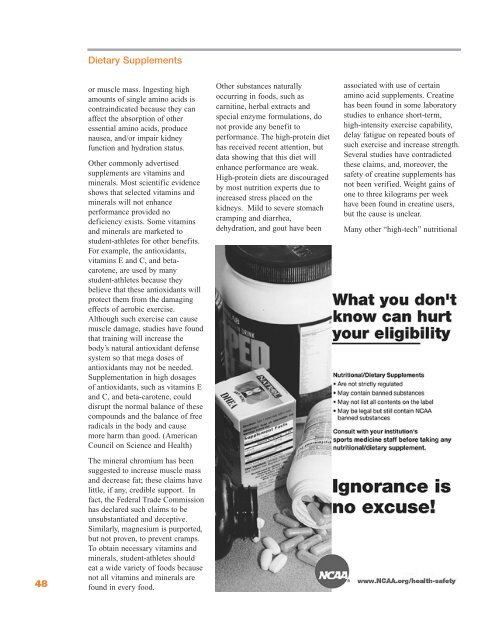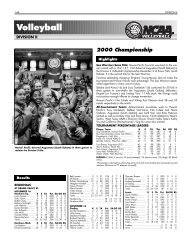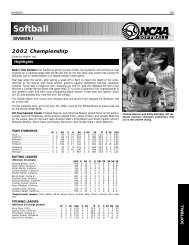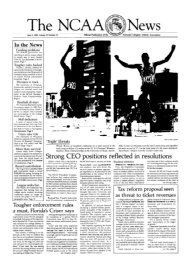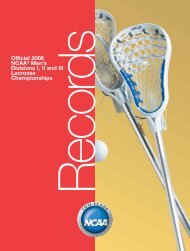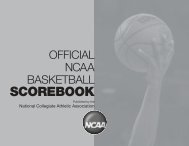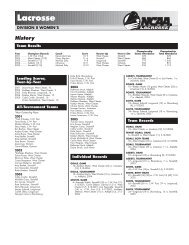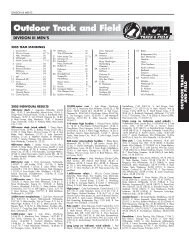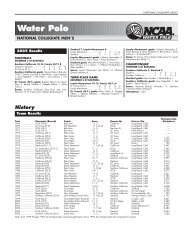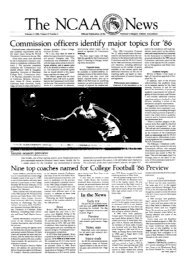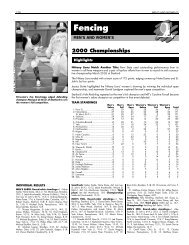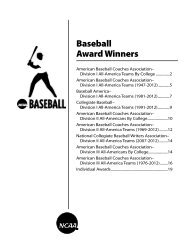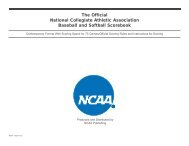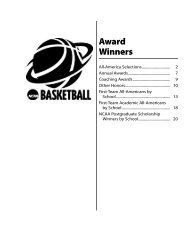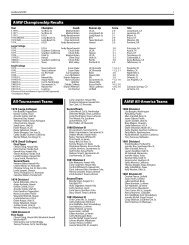Sports Medicine Handbook - NCAA
Sports Medicine Handbook - NCAA
Sports Medicine Handbook - NCAA
You also want an ePaper? Increase the reach of your titles
YUMPU automatically turns print PDFs into web optimized ePapers that Google loves.
48<br />
Dietary Supplements<br />
or muscle mass. Ingesting high<br />
amounts of single amino acids is<br />
contraindicated because they can<br />
affect the absorption of other<br />
essential amino acids, produce<br />
nausea, and/or impair kidney<br />
function and hydration status.<br />
Other commonly advertised<br />
supplements are vitamins and<br />
minerals. Most scientific evidence<br />
shows that selected vitamins and<br />
minerals will not enhance<br />
performance provided no<br />
deficiency exists. Some vitamins<br />
and minerals are marketed to<br />
student-athletes for other benefits.<br />
For example, the antioxidants,<br />
vitamins E and C, and betacarotene,<br />
are used by many<br />
student-athletes because they<br />
believe that these antioxidants will<br />
protect them from the damaging<br />
effects of aerobic exercise.<br />
Although such exercise can cause<br />
muscle damage, studies have found<br />
that training will increase the<br />
body’s natural antioxidant defense<br />
system so that mega doses of<br />
antioxidants may not be needed.<br />
Supplementation in high dosages<br />
of antioxidants, such as vitamins E<br />
and C, and beta-carotene, could<br />
disrupt the normal balance of these<br />
compounds and the balance of free<br />
radicals in the body and cause<br />
more harm than good. (American<br />
Council on Science and Health)<br />
The mineral chromium has been<br />
suggested to increase muscle mass<br />
and decrease fat; these claims have<br />
little, if any, credible support. In<br />
fact, the Federal Trade Commission<br />
has declared such claims to be<br />
unsubstantiated and deceptive.<br />
Similarly, magnesium is purported,<br />
but not proven, to prevent cramps.<br />
To obtain necessary vitamins and<br />
minerals, student-athletes should<br />
eat a wide variety of foods because<br />
not all vitamins and minerals are<br />
found in every food.<br />
Other substances naturally<br />
occurring in foods, such as<br />
carnitine, herbal extracts and<br />
special enzyme formulations, do<br />
not provide any benefit to<br />
performance. The high-protein diet<br />
has received recent attention, but<br />
data showing that this diet will<br />
enhance performance are weak.<br />
High-protein diets are discouraged<br />
by most nutrition experts due to<br />
increased stress placed on the<br />
kidneys. Mild to severe stomach<br />
cramping and diarrhea,<br />
dehydration, and gout have been<br />
associated with use of certain<br />
amino acid supplements. Creatine<br />
has been found in some laboratory<br />
studies to enhance short-term,<br />
high-intensity exercise capability,<br />
delay fatigue on repeated bouts of<br />
such exercise and increase strength.<br />
Several studies have contradicted<br />
these claims, and, moreover, the<br />
safety of creatine supplements has<br />
not been verified. Weight gains of<br />
one to three kilograms per week<br />
have been found in creatine users,<br />
but the cause is unclear.<br />
Many other “high-tech” nutritional


